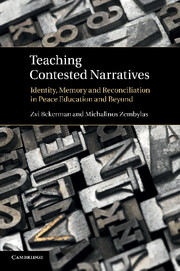Book contents
- Frontmatter
- Contents
- Acknowledgments
- Permissions
- Part I Introduction and theoretical underpinnings
- Part II Living and teaching contested narratives
- Part III Mourning, forgiveness and reconciliation
- 8 The nationalization of mourning in troubled societies
- 9 The work of mourning in schools
- 10 Forgiveness as a possible path towards reconciliation
- Part IV Conclusions
- References
- Index
9 - The work of mourning in schools
Ambivalent emotions and the risks of seeking mutual respect and understanding
Published online by Cambridge University Press: 05 December 2011
- Frontmatter
- Contents
- Acknowledgments
- Permissions
- Part I Introduction and theoretical underpinnings
- Part II Living and teaching contested narratives
- Part III Mourning, forgiveness and reconciliation
- 8 The nationalization of mourning in troubled societies
- 9 The work of mourning in schools
- 10 Forgiveness as a possible path towards reconciliation
- Part IV Conclusions
- References
- Index
Summary
As we pointed out in the previous chapter, the work of mourning (Derrida, 2001) can be broadly understood as a coming to terms with the loss of loved ones (Dastur, 1996). In troubled areas such as the Middle East, mourning for those who lost their lives in past atrocities/wars/conflicts unavoidably takes on a wholly different meaning. In this chapter we examine what happens when the work of mourning becomes part of the school unofficial curriculum and ask: How do teachers and students, who come from conflicting communities, commemorate together past historical events and mourn for those who lost their lives in past atrocities/wars/conflicts, when such events might be interpreted differently by these communities? What feelings are evoked in the process of mourning when it becomes part of the school curriculum, and what are the risks and potential benefits in pedagogical efforts to promote mutual respect and understanding?
We particularly focus on exploring mourning not only as a ritual of existential or political meaning, but also as a source of reconciliation pedagogies (Hattam and Atkinson, 2006). Reconciliation pedagogies are essentially public and school pedagogical practices that examine how certain ideas can enrich our thinking and action towards reconciliation – not through a moralistic agenda but through an approach that views such ideas critically. Mourning can be a valuable source of such pedagogies, if the role of emotion – a major aspect of mourning – is interrogated and normative practices are questioned. These normative practices of mourning not only in wider society but also in schools may be delineated by actions and rituals that reiterate how “they” are despised as responsible for “our” loss in the first place.
- Type
- Chapter
- Information
- Teaching Contested NarrativesIdentity, Memory and Reconciliation in Peace Education and Beyond, pp. 148 - 163Publisher: Cambridge University PressPrint publication year: 2011



